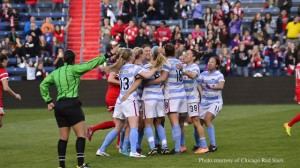LeBolt: Is unequal pay really gender disparity?
 Some people will look for bad news no matter how good the good news is.
Some people will look for bad news no matter how good the good news is.
The U.S. Women’s National Team win the World Cup, but will share a measly $2 million while FIFA paid $8 million in prize money to men’s teams who lost in the first round of the 2014 World Cup.
While we’re comparing, average salaries of NWSL players vs MLS players show grave disparities, too. Numbers don’t lie…or do they? I have never trusted them, because people use numbers and statistics to do their bidding. They pick and choose what to compare, and this is where we need to be cautious. I’m not sure we should be so quick to play the discrimination card.
+READ: USWNT: Enormous turnout as World Cup champs hit NYC for victory parade
After all, since the MLS players have a longer season and play more games, shouldn’t we at least divide their income by the number of games? And since the MLS has five to eight times the average attendance of an NWSL game, plus broadcasting and merchandising revenue, shouldn’t players’ salaries reflect that?
Certainly the women pro’s work just as hard as the men. Do they “deserve” to be paid just the same? I’m not sure.
The NWSL is three years in and holding its own in most markets. It has more promise, perhaps, than its two predecessors, the WUSA and the WPS, but no one’s resting easy here. This time around they’ve been smarter about spending, investing and partnering with groups that can support them. But they’re still a startup, and restarts are expensive.
Lasting change takes time, effort, diligence, diplomacy, patience and consistency in performance. Not to mention money. This is, after all, a business, not a charity, right? Businesses are about revenue, return on investment, and value for the dollar.

In the sports industry this means the product has to be entertaining, exciting, inspiring and successful. They have to sell tickets at the box office, sell merchandise in the stores, and create die-hard fans who will come to the games hoping to see their teams win but who will come any way, even if they lose.
This will take time, and on the part of the owners, staff, coaches and players, it takes industry. What it doesn’t take is crying foul. Whining doesn’t earn you parity. Neither do statistics or graphs meant to illustrate and emphasize the wrongdoing. They stir the pot, but they don’t solve the problem.
+READ: NWSL by the numbers – FIFA Women’s World Cup 2015
Yes, women deserve the chance to compete in athletics. They deserve an equal opportunity to pursue their sports and equal treatment by the governing bodies to provide the coaches, facilities, venues, tournaments, training and equipment. How else can we expect them to succeed? But whether they get paid on a pay scale which is dollar for dollar equivalent with the men (who generate more revenue, and have built their faithful for 20 years) is an interesting and complicated question. If the revenue generated by the women players is much less, where does this income come from?
Businesses are about the bottom line, and the NWSL is a business. Will the third time be a charm? Our World Cup-winning women certainly met and exceeded expectations. But has the NWSL league play done that? Building community, generating momentum and adopting partners all work for it, but business is tough and it’s unforgiving. It doesn’t pat you on the head if you fail, bail you out because you tried hard, or award you a trophy because everyone deserves one. It’s a dollars deal.
 There’s no doubt that women have fought hard to get where they’ve gotten. Title IX has done its work. Women athletes and their coaches are digging deep in the trenches. More than anything they want to offer the opportunities they’ve had to the next generation of girls who will step into their cleats. But whining and complaining won’t do this.
There’s no doubt that women have fought hard to get where they’ve gotten. Title IX has done its work. Women athletes and their coaches are digging deep in the trenches. More than anything they want to offer the opportunities they’ve had to the next generation of girls who will step into their cleats. But whining and complaining won’t do this.
Efforts like the legal action brought by players this year to call out clear instances of discriminatory practices are essential steps in the battle they face. Even though they did not win the turf case against FIFA, they brought the charge. They spoke the truth to power. And as it’s been said, if truth is not being spoken, then power doesn’t shift.
We’ve seen a huge shift in the FIFA ranks in these past weeks, but there is still a huge mountain to climb. If women want to be considered equal partners in the sports arena, as athletes, and in sports careers like coaching and broadcasting, we need to be the best at what we do. Crying foul for what we aren’t getting is a time-waster; we need to demonstrate that what we have accomplished is worthy, and we have what it takes.
+READ: Dure: NWSL can’t remain subservient to national teams
Still, the women’s game — in any sport requiring strength, power or speed — will not look like the men’s version. Women need to find an entertaining and inspiring way to compete that relies on what we can do and how we can do it, not the men’s way, but our own. We need to make run, throw, kick, catch, hit like a girl: something girls are proud of, rather than embarrassed about.
 Women’s play may not be as spectacular, physically, as the men’s, but this should be part of the attraction. Normal human beings can actually aspire to do what women do. We can score from midfield, talk to the media, sign autographs, and make the dream real for those adoring fans, both male and female, who lined the streets of New York city for the ticker tape parade.
Women’s play may not be as spectacular, physically, as the men’s, but this should be part of the attraction. Normal human beings can actually aspire to do what women do. We can score from midfield, talk to the media, sign autographs, and make the dream real for those adoring fans, both male and female, who lined the streets of New York city for the ticker tape parade.
Now that the USWNT has gotten this party started, the Women’s Sports foundation has a message for us. If we really want women’s sports to thrive in the U.S., we need to:
- Attend women’s sporting events
- Support companies who advocate for women’s athletics
- Encourage television stations and newspapers to cover women’s sports
- Sign up to coach a girls’ sports team, recreational or high school
- Encourage young women to participate in sports
- Become an advocate if you know a female athlete who is being discriminated against.
It’s nice to believe that we have won, but let’s not let winning the salary battle argument and the gender parity debate distract us from our responsibility to put our money and time where our mouth is. If we cannot or will not do this, do we really want women’s sports to thrive?
SOCCERWIRE MARKETPLACE
- visitRaleigh.com Showcase Series 2025, hosted by NCFC Youth
- OFFICIAL MANCHESTER CITY SOCCER CAMPS
- Wanted Licensed Youth Soccer Coach
- Join Official Elite Summer Soccer Camps with Europe’s Top Pro Clubs!
- The St. James FC Travel Staff Coach - North (Loudoun) & South (Fairfax)
- The St. James FC Girls Academy (GA) Head Coach - 2 teams
- The St James FC Boys Travel Tryouts
- OFFICIAL BAYERN MUNICH SUMMER CAMPS U.S.
- JOIN THE ALLIANCE!
- OFFICIAL FC BARCELONA CAMPS U.S.











